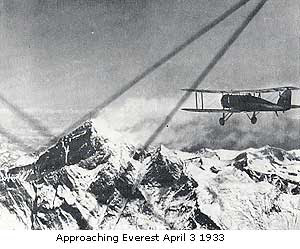Probably the world highest airstrip "Mingbo airstrip"is fully abandoned and not in use at all but it has own great history .
God father of Sherpa people Sir Edmund Hillary wrote in his book “View from the Summit”
"Several of us returned to Kathmandu in early January to organise a second lift of supplies and while we were there I was approached by the Swiss pilot, Capt

ain Schrieber, who wanted somewhere he could drop International Red Cross relief to the Tibetan refugees. They were in a pitiful condition, for on the 10th March 1959 there had been a Tibetan uprising against the Chinese in Lhasa. The Chinese retaliated with great force. Thousands of Tibetans were killed by Red Army troops. Seven days later the young Dalai Lama fled Lhasa to seek political asylum in India, followed by over 80,000 Tibetan refugees, some of whom crossed the border into the Everest region. Captain Schrieber had a Pilatus Porter aircraft with an outstanding high-altitude performance, but he didn’t know of any place to land in the Khumbu. I remembered the site I’d pointed out to Peter Muigrew up the Mingbo valley, but warned Captain Schrieber that it was at 15,000 feet. This didn’t seem to worry him, and we agreed that, if I could devote expedition effort to clearing the Mingbo landing strip he, in return, would fly in several loads of aluminium sheets to build a school at Khumjung. So at my request, the Silver Hut wintering group put a team of men onto levelling the site at 15,000 feet, chopping off the frozen clumps of snow grass, filling in the worst of the holes, and rolling away the large boulders. Snow sometimes restricted their activity but it rarely lay for long once the sun was shining again. When the strip had been cleared to 400 yards the first landing was made. Unfortunately, the aircraft damaged its tail wheel on a rock and had an unscheduled stay of some days while being made airworthy again. Work on the strip continued for some months and we finally enlarged it to 500 yards and generally improved it.

At the take-off end were two huge boulders weighing many tons and standing six feet above the ground. We had no explosives and the boulders were singularly unresponsive to the blows of our sledge-hammer. The problem was finally solved in a highly ingenious fashion by our Sherpas. They dug enormous craters beside each boulder and then used long heavy poles as levers to tip the boulders out of the way into the holes. Altogether we paid $900 for the labour used on building this strip, which possibly made it one of the cheapest as well as one of the highest airfields in the world. Due to the skill and experience of Captain Schrieber, large quantities of refugee food was transported safely into Mingbo and we for our part were helped considerably with the rapid freighting. of personnel, scientific equipment and our school building.
Hillary describes a takeoff and landing at Mingbo airstrip:
We were short on seats so June Mulgrew was put on the floor in the back of the plane and tied down with a piece of rope, facing sideways like in a tram. Captain Schrieber calmly told her, “If anything happens just undo the rope.” Louise didn’t like small aircraft and she was very nervous and upset. I could understand this, as there was no second chance, but it didn’t stop me from subjecting her to small plane flights.
We were loaded to the maximum. Captain Schrieber started up the motor and revved it fiercely, while the two large rocks wedged under the wheels for brakes were removed and we roiled forward onto two smaller ones. The motor was given full throttle and the plane shuddered with power as the wheels inched over the small rocks and then rolled suddenly down the other side. With the motor blaring like a demon we surged into our take-off run. To my startled eyes the short strip ahead of us seemed quite inadequate for our needs and the hill

at the end loomed up with frightening rapidity. At the last moment Captain Schrieber pulled back on the stick and we lifted sluggishly off the ground. Next moment he had tipped up onto one wing to dodge the hill and we were slipping through the gully to the left, to be precipitated out into free air as the river valley dropped sharply away beneath us. With a sigh of relief, I unclenched my hands as we soared high over Tengboche and set course for Kathmandu.
The return to Mingbo on 5th April 1960 was a terrifying experience. Civil aviation in Kathmandu had only just become aware that the Mingbo airfield was operating, even though it had been in action for several months. They demanded that one of their experts should fly in with us and check it out. It was quite turbulent as we made our approach towards the hill at the bottom of the Mingbo runway. As Captain Schrieber headed down there was a fierce sideways gust of wind and the aircraft started sliding towards the left-hand edge of the field. Captain Schrieber’s reaction was immediate — he just dropped the aircraft from thirty feet to land with a huge thud and then rolled upwards close to the rocks on the left-hand side where we stopped safely at the top. We were all severely shaken. The Civil Aviation gentleman staggered out of the aircraft and vomited noisily. Then he declared the airfield closed for all time. When he was informed that this would involve him in a seventeen-day walk to Kathmandu, he reopened the airfield for one last flight. Captain Schrieber wasn’t too concerned — he’d flown in all the food for the Tibetans and our Khumjung School material had been brought in, too. "
Please feel free to leave comments, questions, or suggestions!






